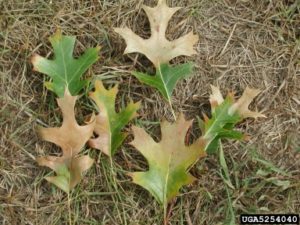Prevent Oak Wilt by Pruning Oak Trees in the Winter

Wilt pattern in oak leaves. Photo by Joseph O’Brien, USDA Forest Service.
Oak wilt is a fungal disease that is carried to oak trees by small beetles that feed on the sap produced from fresh wounds to the tree (i.e. pruning, storm damage). The spores of the fungus then move through the vascular system of the infected tree, which is responsible for transporting water throughout the tree. Once the tree detects the infection, it tries to mitigate the further spread of the fungus by plugging infected cells. This in turn leads to the browning of leaves and the wilting of branches on the oak tree. Oak wilt disease is prevalent throughout the Lower Peninsula and in regions of the Upper Peninsula along the Wisconsin border and it primarily impacts red oaks.
Although the spring season is usually the ideal time for many people to complete yard work, oak trees benefit greatly from being pruned during the winter months instead. Oak trees are far less likely to become infected with oak wilt disease when pruned in the winter since the beetles that carry and spread the disease to the trees are almost completely inactive during the cold winter months. Thus, those who intend to prune their oak trees are encouraged to do so in the winter instead of the high-risk period from April 15-July 15 when the beetles are most active.
Firewood is also a known contributor to the spread of oak wilt disease, and oak firewood should not be moved to prevent the chance of healthy oak forests being impacted by firewood that is host to oak wilt disease. If you suspect your oak firewood to be infected, the Michigan Department of Natural Resources (DNR) recommends the wood be burned, debarked or chipped before April. Or, once the wood has dried for a year and the bark has loosened, the oak firewood is unlikely to spread disease.
If you’re interested in learning more about oak wilt disease and what you can do to prevent it, please review the Michigan State University Extension article on the topic HERE . More information is also available from the Michigan DNR HERE .
The post Prevent Oak Wilt by Pruning Oak Trees in the Winter appeared first on Michigan United Conservation Clubs.
Recent Posts



